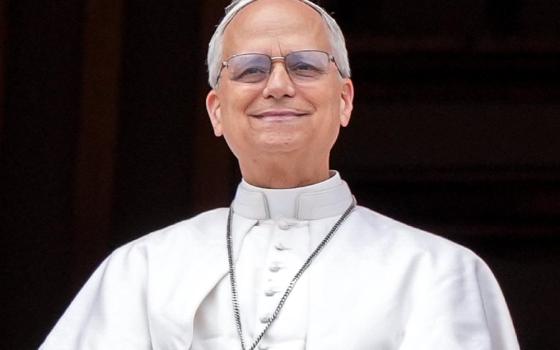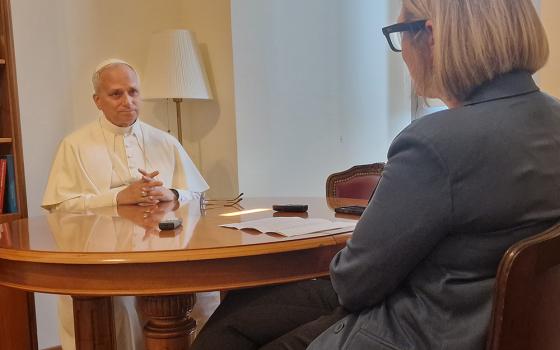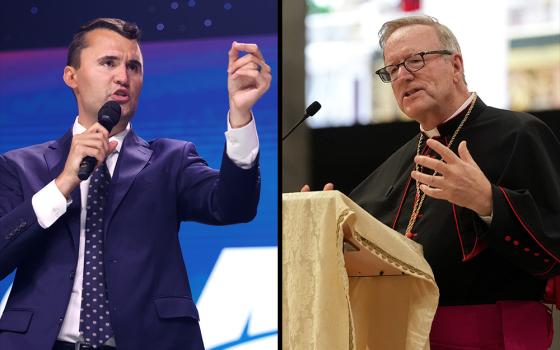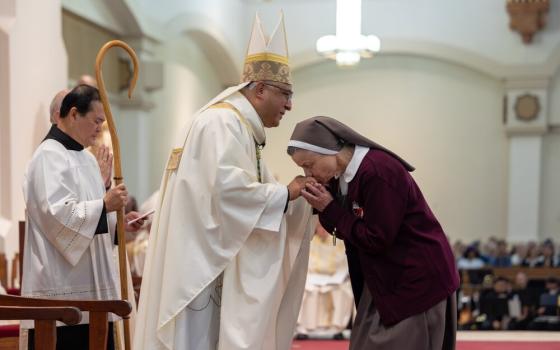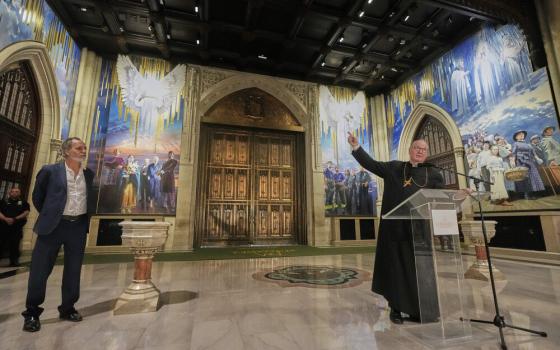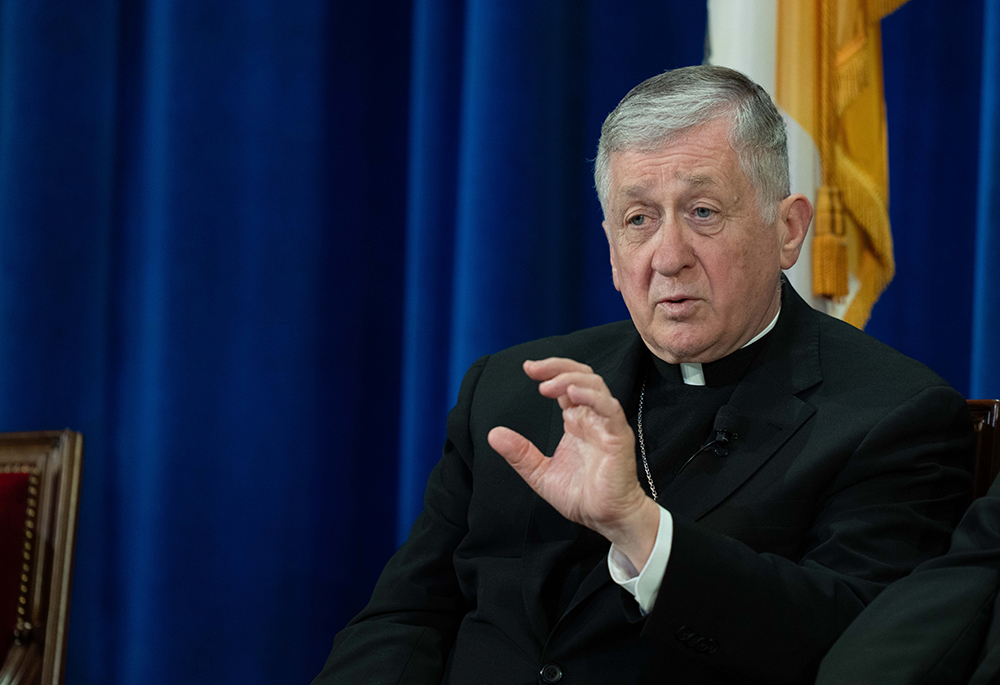
Cardinal Blase J. Cupich of Chicago speaks at a news conference May 9, 2025, at the Pontifical North American College in Rome. Cupich spoke Aug. 7 in Nagasaki about the church's teaching on war. Cupich was there to mark the sad anniversary of the atomic bombs dropped on that city and on Hiroshima in 1945. (CNS/Kendall McLaren)
Chicago Cardinal Blase Cupich delivered an important address in Nagasaki yesterday (Aug. 7) about the church's teaching on war. Cupich was there to mark the sad anniversary of the atomic bombs dropped on that city and on Hiroshima in 1945. Three other U.S. prelates — Washington Cardinal Robert McElroy, Santa Fe Archbishop John Wester and Seattle Archbishop Paul Etienne — were on the pilgrimage to the two Japanese cities as well.
Cupich recalled the history that led to the decision to drop the atomic bombs. "During the course of World War II, large numbers of civilians in cities had already become targets prior to the atomic bombings." He noted the German aerial attacks on London and the Allies' attacks on German cities. "Tragically, the traditional insistence on noncombatant immunity had crumbled during the savagery of World War II." Our moral progress could not keep up with our technological progress. "They did it first" is a moral argument appropriate to a playground, not to the halls of governmental authority.
War invites us to dehumanize our opponents. "Historians tell us that when President Harry Truman decided the atomic bombs should be used he did not find it a difficult decision," Cupich said. Indeed, for Truman, he saw his primary obligation as commander-in-chief to be shortening the war and limiting the casualties of American soldiers above all.
The cardinal then turned to a consideration of just war theory. The intentional targeting of civilians must become "unthinkable," he said. "The just war tradition must be a resource for the moral formation not only of the military but the general population of a nation. Helping people resist ideas of retribution, hatred, ethnocentrism, and nationalism should be a necessary element in any articulation of the just war tradition. For the just war tradition to remain a credible moral approach it must be situated within the broader context of an ethic of solidarity which gives priority to peacebuilding."
In common usage, people think a war is just if the cause is just, but just war theory has many requirements before it considers a recourse to war as a just decision. And it also has strict requirements about the conduct of war, including the insistence on never targeting civilians. It is not enough that the cause be just. War must be a last resort, and engaged in by competent legal authorities. It must have a reasonable chance of success and be a proportional response to the crime it aims to end. And war must be fought in ways that are just too.
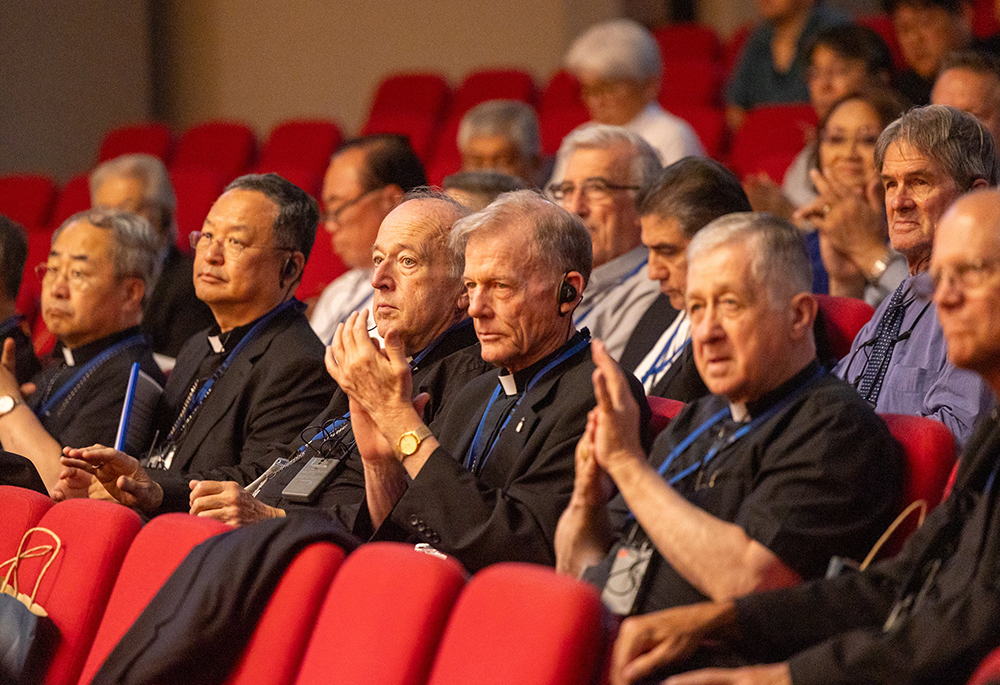
Washington Cardinal Robert W. McElroy, center, and other U.S. prelates attend a peace event hosted Aug. 5, 2025, by the Diocese of Hiroshima, Japan, where atomic bombing survivors were honored. Pictured with the cardinal, left to right, are Archbishop John C. Wester of Santa Fe, New Mexico, Cardinal Blase J. Cupich of Chicago and Archbishop Paul D. Etienne of Seattle. (OSV News/Catholic Standard/Mihoko Owada)
Cupich argued that nuclear deterrence can never achieve a full peace. "The use of threats, which is the essence of the strategy of nuclear deterrence, can never bring about the peaceful coexistence between nations that an ethic inspired by solidarity, authentic development, and human rights can produce." In a striking phrase, he said: "Genuine peace is more than a fearful truce."
Though not a central theme of his text, the most problematic part of Cupich's talk came when he addressed the relationship of traditional just war theory to nonviolence in crafting the church's approach to issues of war. "A more holistic approach, an integral one, places disarmament within the wider concern for peace and the need to address the deeper roots of our reliance upon nuclear weaponry," he said. "And I would add in line with what my brother Cardinal McElroy has argued, priority should be given to nonviolence in crafting a holistic approach to Catholic teaching on conflict, with just war theory focused on weaponry taking a more secondary role." Here is a report on the talk McElroy gave where he outlined his preference for nonviolence.
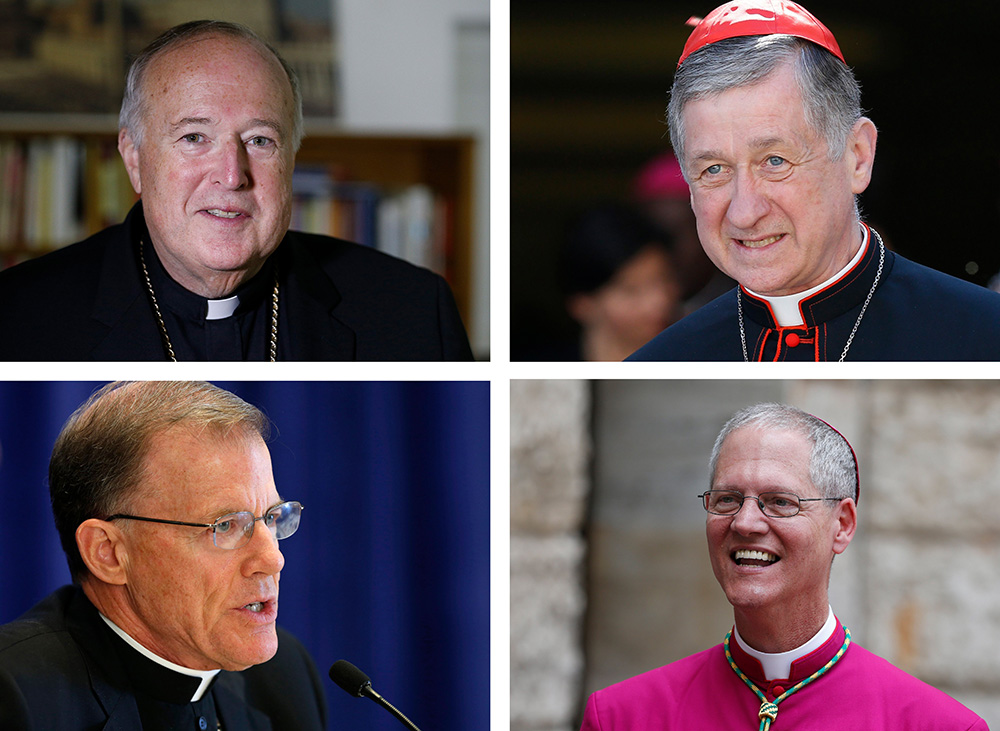
Cardinals Robert W. McElroy of Washington, Blase J. Cupich of Chicago, and Archbishops John C. Wester of Santa Fe, New Mexico, and Paul D. Etienne of Seattle are pictured in a combination photo. (OSV News files/OSV News/CNS)
I disagree with McElroy and Cupich on this point. It is not a matter of priority for one approach over the other. The Catholic stance towards armed conflict must allow both traditions — just war and nonviolence — to challenge each other constantly in an uneasy tension.
For example, if the world had followed the advice of some of the most prominent nonviolent activists in the wake of the Russian invasion of Ukraine, such as this essay by Georgetown University's Eli McCarthy published here at NCR, Ukraine would no longer exist. Regarding Ukraine, we can repeat the chilling and challenging verdict of George Orwell about pacifism during World War II: "Pacifism is objectively pro-fascist."
Advertisement
Similarly, nonviolent theory can help just war theory from collapsing into a lazy apologetics for war. After the terrorist attacks of Sept. 11, 2001, America went to war in Afghanistan. We had a just cause, but the war failed a different criterion of just war theory: a reasonable prospect of success. Like Britain and Russia beforehand, America learned that the people and geography of Afghanistan could not be conquered. That was a time when we needed nonviolent witness and arguments to point out the fallacy of America's military plans.
When it comes to commemorating the bombings in Japan 80 years ago, however, all Christians and people of goodwill can agree with Cupich that the targeting of civilians in war must become unthinkable. Further, efforts to halt the proliferation of nuclear armaments and begin disarming those we have should commence. Finally, our society should think more deeply about how it can create conditions for peace, within and without our borders. The four prelates who traveled to Hiroshima and Nagasaki this week provided a poignant Christian witness to these lessons from history and this invitation in the Gospel to work tirelessly for peace.

